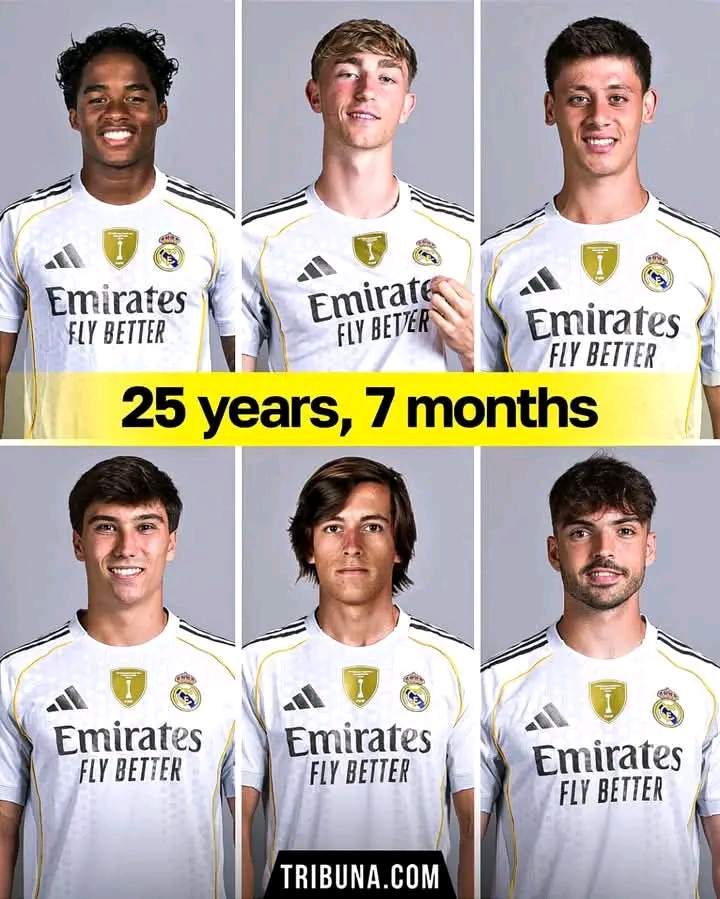Sport
new era begins The current Real Madrid squad is their youngest team in 21st century with just 25 years and 7 months average age

Real Madrid have officially entered a new chapter in their illustrious history, and it’s one that could define the next decade of European football. The club’s current squad has been revealed to be the youngest in the 21st century, boasting an average age of just 25 years and 7 months. For a team known for blending superstar experience with raw talent, this represents a significant shift towards youth-driven dominance.

The transformation didn’t happen overnight. In recent seasons, Los Blancos have strategically phased out several of their legendary veterans while steadily introducing a new wave of hungry, talented players. The departures of Toni Kroos, Luka Modrić, and Karim Benzema marked the symbolic end of an era, making room for rising stars to step into the spotlight.
This youthful Real Madrid is not short on quality. Names like Jude Bellingham, Vinícius Júnior, Aurélien Tchouaméni, Eduardo Camavinga, and Rodrygo have already proven themselves on the biggest stages. Together, they form the core of a team that not only has energy and speed but also tactical maturity far beyond their years.
The club’s management, under the guidance of president Florentino Pérez and coach Xabi Alonso, has deliberately moved away from an over-reliance on aging superstars. Instead, the focus is on building a sustainable, competitive squad that can dominate domestically and in Europe for years to come. This approach has echoes of the Galácticos era, but with a modern twist — prioritizing long-term performance over short-term stardom.
Real Madrid’s average age figure becomes even more impressive when considering their squad depth. Even their backup options in key positions are young, brimming with potential, and eager to prove themselves. It’s a stark contrast to the early 2010s, when many of Madrid’s key players were entering their thirties.
The benefits of this youthful approach are already visible on the pitch. The team plays with relentless intensity, pressing high, attacking with pace, and showing remarkable recovery speed when defending. These qualities are hallmarks of younger squads, but Madrid’s added technical precision makes them especially dangerous.
Still, experience has not been completely abandoned. The presence of leaders like Dani Carvajal, Antonio Rüdiger, and Thibaut Courtois ensures that the younger players have role models who understand what it takes to win titles in Madrid’s high-pressure environment. This balance between youth and experience could be the secret weapon in their pursuit of silverware.
Another advantage of this generational shift is financial sustainability. By investing in players at a younger age, Real Madrid can potentially avoid the massive transfer fees often associated with buying established stars in their prime. This strategy also allows them to shape players’ careers from an early stage, ensuring loyalty and a long-term fit with the club’s playing philosophy.
The excitement among Madridistas is palpable. Social media is buzzing with optimism, with fans believing this youthful squad has the potential to create a new dynasty. Some are already drawing comparisons to the club’s golden eras, predicting that this group could match — or even surpass — the legendary successes of the past.
As the 2025/26 season unfolds, all eyes will be on how this young team handles the challenges of competing in La Liga and the Champions League. If they can combine their fearless energy with consistency and mental resilience, Real Madrid’s youth revolution could truly mark the beginning of an unforgettable era in football

 Sport12 months ago
Sport12 months ago“I’m not trying to criticize Ancelotti, but I’m not happy with him for benching that player”: Bellingham Expresses Frustration Over Ancelotti’s Tactical Decision

 Sport12 months ago
Sport12 months agoBREAKING: Manchester City vs Liverpool Clash Cancelled! Title Race Takes a Twist

 Sport12 months ago
Sport12 months agoArsenal Poised for January Swoop on €70 Million Star Dusan Vlahovic

 Sport12 months ago
Sport12 months agoWHAT ON GOD’S GREEN EARTH DID WE JUST SEE?!

 Sport12 months ago
Sport12 months agoReal Madrid: Carlo Ancelotti’s Surprising Revelations About an Unexpected Quality of Vinicius

 Sport12 months ago
Sport12 months agoBREAKING: Arsenal’s Champions League Quarterfinal Opponent Revealed After Monaco’s Dramatic Win – Tough Challenges Await Arteta’s Men

 Sport12 months ago
Sport12 months agoChelsea Players Facing Suspension as Yellow Cards Mount

 Sport12 months ago
Sport12 months agoKey Arsenal Player Set for Return as Gunners Face Struggling Everton
















